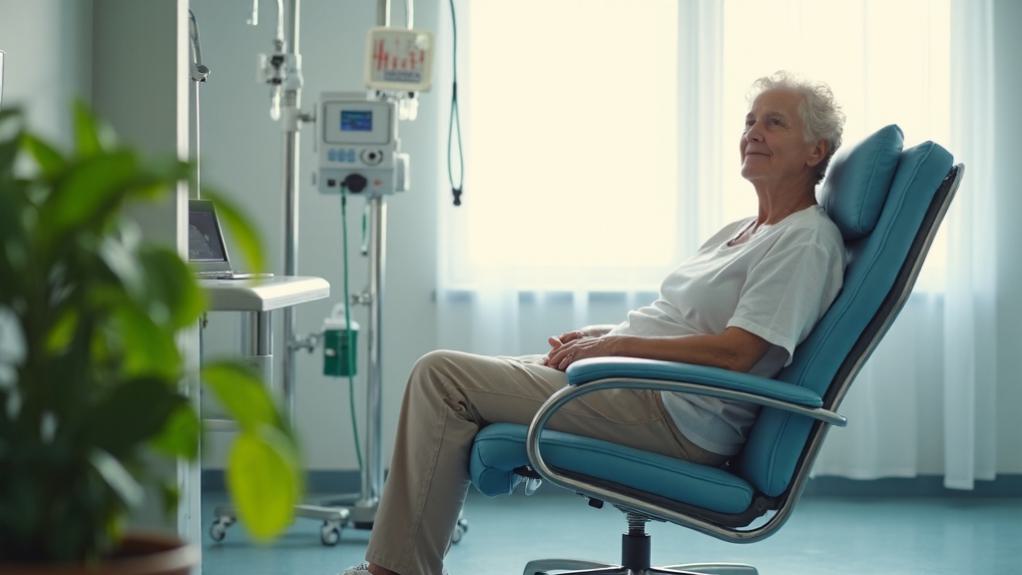Did you know that over 2.8 million people worldwide live with Multiple Sclerosis (MS), a chronic neurological condition affecting the central nervous system? As you navigate the complexities of managing this disease, you’ll encounter diverse treatment options—from disease-modifying therapies like dimethyl fumarate to innovative approaches such as Hematopoietic Stem Cell Transplantation. With varied outcomes and costs, especially in countries like India, there’s much to explore about optimizing your care.
Key Takeaways
- Multiple Sclerosis treatment includes disease-modifying therapies to reduce relapses and slow progression.
- Stem cell therapy and HSCT offer innovative options for severe MS cases.
- Dimethyl fumarate is the only approved MS medication in India for early intervention.
- Corticosteroids manage acute relapses, while immunotherapy helps progressive forms.
- India provides cost-effective, advanced MS care with personalized treatment plans.
The quest for effective management of Multiple Sclerosis (MS), a chronic autoimmune disorder affecting the central nervous system, has led to significant advancements in treatment options, particularly in India, where access to innovative therapies is expanding. As you handle the complexities of managing this condition, you’ll find that India offers a spectrum of cutting-edge treatments, ranging from stem cell therapy to conventional medications, tailored to mitigate the debilitating effects of MS. With a growing network of specialized facilities, such as Max Healthcare in Delhi, which hosts a dedicated Multiple Sclerosis Clinic, you can access thorough diagnostic and therapeutic services under one roof, ensuring a streamlined approach to care.
Delving into specific interventions, you’ll discover that stem cell therapy stands out as a promising option, requiring only three days of hospitalization while offering long-lasting benefits through its neurogenerative and neuroprotective properties. This scientifically validated method, often more cost-effective than traditional invasive procedures, efficiently targets affected areas, providing a safer alternative for those seeking sustained relief. Additionally, if you’re considering more intensive approaches, Hematopoietic Stem Cell Transplantation (HSCT) might appeal to you, as it aims to “reboot” your faulty immune system, presenting a potential breakthrough for severe MS cases, though it demands careful evaluation of risks and benefits. Given that MS often progresses over time in more than half of the cases, leading to accumulating disability, progressive disease nature is a critical factor to consider when choosing a treatment plan. Notably, HSCT has shown remarkable results, with studies indicating that 87% of patients experience no more relapses after four years post-treatment at specialized centers like HSCT Hospital India.
Beyond these innovative therapies, you can explore conventional treatments like dimethyl fumarate, the only approved medication for MS in India, recommended for early initiation during the inflammatory phase to curb disease progression. Complementing pharmacological options, neurorehabilitation programs are available to enhance your physical and cognitive functions, fostering greater independence, while immunotherapy offers a strategic modulation of your immune system to prevent attacks on nerve fibers, particularly beneficial for progressive forms of MS. Experts like Dr. Rahul Bhargava, renowned for his expertise in hematology and neurological care, provide advanced treatment plans, ensuring you receive personalized attention.
As you weigh these options, remember that India’s evolving healthcare landscape, bolstered by specialized clinics and expert practitioners, equips you with diverse tools to manage MS effectively. By staying informed and consulting with professionals, you’ll find a pathway tailored to your unique needs, handling this chronic condition with resilience and hope.
Overview
Multiple Sclerosis (MS) is a chronic autoimmune disease that affects the central nervous system, where the immune system mistakenly attacks the protective myelin sheath surrounding nerve fibers, leading to disrupted communication between the brain and the body. This can result in a wide range of symptoms, including fatigue, mobility issues, vision problems, and cognitive impairment. Treatment for MS focuses on managing symptoms, reducing the frequency of relapses, and slowing disease progression through various approaches such as disease-modifying therapies (DMTs) available in injectable, oral, and intravenous forms, corticosteroids for acute relapses, and supportive therapies like physical therapy and psychological support. Emerging treatments, including stem cell therapy and B cell-targeting therapies, are also being explored. Additionally, early intervention with DMTs can significantly lower relapse rates and reduce the risk of new lesions in the brain and spinal cord. These treatments are essential for individuals diagnosed with MS, particularly those with relapsing-remitting MS, progressive forms of the disease, or those experiencing frequent relapses, as early and tailored intervention can greatly improve quality of life and delay disability progression. Recent advances in MS management emphasize the importance of using higher-efficacy drugs early in the disease course to prevent permanent disability.
Treatment Details and Key Information
Multiple Sclerosis (MS) treatment in big corporate hospitals in India, such as Apollo, Fortis, and Max Healthcare, offers advanced care tailored for foreign patients, including personalized treatment plans and assistance with travel and accommodation. These hospitals provide a range of Disease-Modifying Therapies (DMTs) like Interferon Beta, Natalizumab, and Ocrelizumab, alongside acute relapse management with corticosteroids and plasma exchange for severe cases. The duration of hospital stay varies depending on the treatment; for acute relapse management with steroids or plasmapheresis, it may range from 3 to 7 days, while DMT initiation often requires only outpatient visits or short stays of 1-2 days for infusions. Total recovery time depends on the disease stage and treatment response, with relapses potentially taking weeks to months for symptom improvement. Procedure times also vary—steroid administration or infusions like Ocrelizumab may take a few hours, while plasmapheresis sessions can last 2-4 hours over multiple days. MS treatments in India primarily focus on medical management rather than surgical interventions, so robotic or non-robotic procedures are not typically applicable. However, hospitals may offer advanced diagnostic tools and monitoring systems for precise treatment delivery. Additionally, physiotherapy and exercises are often recommended to support movement and alleviate muscle pain for better mobility. The pros of medical management include non-invasiveness and targeted immune modulation, but cons include potential side effects like infections or autoimmune risks with drugs like Alemtuzumab, requiring regular monitoring. Additionally, some hospitals integrate lifestyle counseling and rehabilitation services, enhancing overall care for international patients. It’s important to note that while there is no cure for MS, these treatments aim to minimize damage and manage symptoms effectively.
Key Benefits & Advantages
Multiple Sclerosis (MS) treatment in India offers a compelling choice for patients due to its combination of advanced medical facilities, experienced neurologists, and cost-effective care. The country has seen substantial advancements in disease-modifying therapies (DMTs) and early aggressive treatment approaches, which have shown high success rates in reducing relapse rates and slowing disability progression. Studies indicate that early intervention with high-efficacy therapies can substantially improve long-term outcomes, with many patients experiencing better control over symptoms like muscle weakness and cognitive impairments. Additionally, India’s healthcare system emphasizes patient management strategies to guarantee adherence to treatment plans, enhancing overall effectiveness. The affordability of treatments, coupled with access to cutting-edge therapies, makes India a preferred destination for MS care, providing patients with a high quality of life at a fraction of the cost compared to Western countries. Research, such as the perspective review by Daniel Ontaneda and Daniela Di Capua, highlights the importance of weighing benefits versus risks in the latest MS therapies to optimize patient outcomes.
| Country | Average Cost of MS Treatment (Annual, USD) | Affordability (Relative to Income) | Access to High-Efficacy Therapies |
|---|---|---|---|
| India | 3,000 – 6,000 | High | Widely Available |
| United States | 50,000 – 70,000 | Low | Widely Available |
| United Kingdom | 20,000 – 30,000 | Moderate | Available with Restrictions |
| Germany | 25,000 – 40,000 | Moderate | Widely Available |
| Australia | 30,000 – 50,000 | Moderate | Available with Restrictions |
Other Key Advantages and Benefits:
- Early Intervention Focus: Indian healthcare providers prioritize early aggressive treatment, which is supported by research to prevent irreversible disability and improve long-term prognosis.
- Holistic Symptom Management: Access to physical therapy and symptomatic treatments helps alleviate common MS symptoms like fatigue, pain, and spasms, enhancing patient independence.
- Growing Medical Tourism: India is a hub for medical tourism, offering world-class treatment facilities and personalized care plans at affordable rates, attracting international patients seeking effective MS management.
Treatment Process
The treatment process for multiple sclerosis (MS) typically begins with a thorough diagnosis, involving neurological exams, magnetic resonance imaging (MRI) to detect brain and spinal cord lesions, and sometimes lumbar punctures to analyze cerebrospinal fluid for signs of inflammation. Once diagnosed, a treatment plan is tailored to the patient’s specific type of MS, such as relapsing-remitting or primary-progressive, and their individual health factors. Before initiating disease-modifying therapies (DMTs), baseline blood tests and screenings are often conducted to assess liver function, immune status, and potential risks for side effects, ensuring the chosen therapy is safe for the patient. For acute relapses, corticosteroids may be administered intravenously over 5-7 days, requiring minimal preparation beyond a medical assessment to confirm the relapse and rule out infections. If plasma exchange is needed due to steroid ineffectiveness, patients undergo a pre-procedure evaluation to check vascular access and overall health stability. Throughout the process, patients are educated on the treatment goals, potential side effects, and the importance of adherence, while supportive therapies like physiotherapy may be integrated early to address mobility or fatigue, often starting with an initial assessment by a rehabilitation specialist to customize the program.
Expected Outcomes
Patients with multiple sclerosis (MS) can expect several positive outcomes from current treatment approaches, particularly with the use of disease-modifying therapies (DMTs). These treatments are designed to substantially reduce the frequency of relapses, slow disease progression, and prevent the formation of new brain lesions, ultimately delaying the onset of disability. Many patients experience an improved quality of life through symptomatic and rehabilitation therapies, which address specific symptoms and enhance daily functioning. Long-term effectiveness is often seen with early initiation of DMTs, leading to better disease management and an enhanced prognosis, with some patients even achieving periods of disease stability or “benign” forms of MS over time. Success rates vary depending on individual responses to treatment, disease type, and severity, but highly effective therapies have shown promising results in reducing or eliminating relapses in many cases. However, risks such as side effects from medications or varying efficacy must be considered, and personalized treatment plans are essential to optimize outcomes.
After-Treatment Care & Recovery
After undergoing treatment for multiple sclerosis (MS), patients require thorough after-treatment care and recovery strategies to manage symptoms and maintain quality of life. Post-treatment medical requirements often include medication management, such as corticosteroids to reduce inflammation during relapses, typically administered for 3 to 5 days followed by a tapering phase, alongside strict adherence to prescribed disease-modifying therapies to control disease progression. Regular medical check-ups are essential for monitoring the disease and adjusting treatment plans, while physiotherapy, occupational therapy, and speech therapy are integrated to address specific symptoms and improve functional abilities. During the recovery phase, precautions such as avoiding overexertion and managing stress are essential to prevent exacerbations, and patients are encouraged to participate in rehabilitation programs, which may be outpatient for less severe cases or inpatient for significant physical disabilities. Lifestyle changes play an essential role, including regular exercise to enhance cardiovascular health and reduce weakness, adopting a balanced diet to support overall health, practicing stress management techniques like meditation or yoga, maintaining consistent sleep patterns to combat fatigue, and connecting with support groups for emotional well-being.
References
- https://www.stemcellcareindia.com/diseases/multiple-sclerosis-stem-cell-treatment/
- https://hsctindia.com
- https://pmc.ncbi.nlm.nih.gov/articles/PMC4604693/
- https://www.maxhealthcare.in/our-specialities/neurology/conditions-treatments/multiple-sclerosis
- https://www.drrahulbhargavahematologist.com/fyi/multiple-sclerosis-treatment-in-india/
- https://www.mayoclinic.org/diseases-conditions/multiple-sclerosis/diagnosis-treatment/drc-20350274
- https://pmc.ncbi.nlm.nih.gov/articles/PMC7704606/
- https://my.clevelandclinic.org/health/diseases/17248-multiple-sclerosis
- https://www.nationalmssociety.org/managing-ms/treating-ms/treatments-and-medications
- https://www.webmd.com/multiple-sclerosis/ms-treatment

